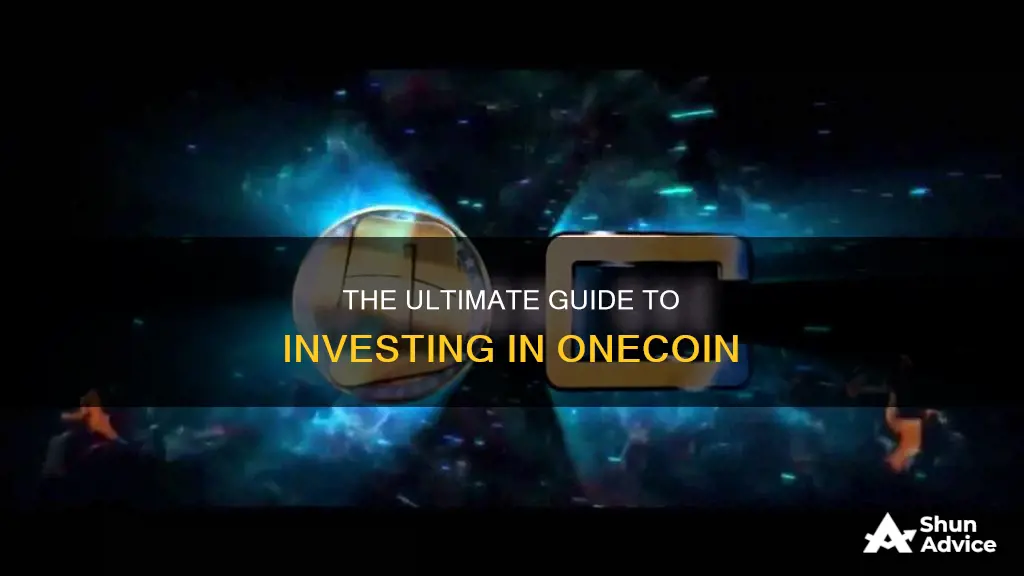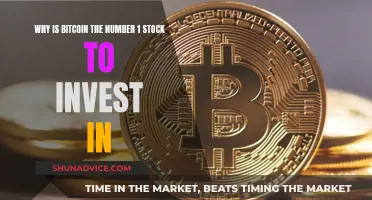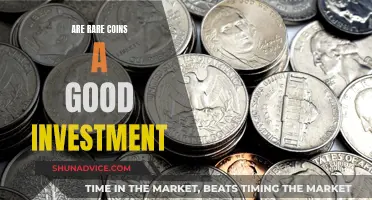
OneCoin is a fraudulent cryptocurrency scheme that duped investors out of billions of dollars. Founded by Ruja Ignatova in 2014, it was marketed as a cryptocurrency, but in reality, it lacked blockchain technology and was a Ponzi scheme. The company's main business was selling educational material for cryptocurrency trading, with investors paying for expensive packages and receiving tokens to mine OneCoins. However, no actual mining process existed, and the company maintained its own database of coins. The scheme was exposed by authorities, and Ignatova disappeared in 2017, with other leaders of the company arrested and sentenced to prison terms.
What You'll Learn

OneCoin's fraudulent Ponzi scheme
OneCoin is a fraudulent cryptocurrency scheme run by offshore companies OneCoin Ltd and OneLife Network Ltd, both founded by Ruja Ignatova and Sebastian Greenwood. It is considered a Ponzi scheme due to its structure of paying early investors with money from newer ones. It was also a pyramid scheme as it recruited investors without providing any actual product.
OneCoin was launched in late 2014 and was marketed as a cryptocurrency. However, it was not a decentralized cryptocurrency but rather a centralized pyramid scheme hosted on OneCoin Ltd's servers. The company maintained its own database of coins rather than using a blockchain and had no mining process, limiting its ability to release and circulate coins.
According to OneCoin, its main business was selling educational material for cryptocurrency trading. Investors could buy "educational packages" costing anywhere from 100 euros to 118,000 euros or even 225,500 euros, according to one industry blog. These packages often contained plagiarized content from free sources such as Wikipedia. Investors also received "tokens" that could supposedly be used to mine OneCoins, although no actual mining process existed.
The only way to exchange OneCoins for other currencies was through the OneCoin Exchange ("xcoinx"), an internal marketplace for members who had invested more than a set amount. OneCoins could be exchanged for euros, which were placed in a "virtual wallet". The marketplace had daily selling limits based on the package the seller had invested in, limiting the amount of OneCoins that could be exchanged by the scam's victims.
Despite warnings from central banks and government agencies, people all over the world invested in OneCoin. The scheme brought in approximately $4 billion worldwide, with law enforcement in China alone recovering US$267.5 million while prosecuting 98 people.
In 2017, Ignatova disappeared when a secret US warrant was filed for her arrest, and her brother, Konstantin Ignatov, took her position at the company. Most of the leaders of the company disappeared or were arrested, though Ignatova has evaded arrest. Several people connected to OneCoin have been arrested and charged with money laundering and fraud, with some pleading guilty and receiving prison sentences.
OneCoin's fraudulent nature and the actions of its leaders highlight the dangers of investing in schemes that promise high returns with little risk. It is essential for investors to conduct thorough research and due diligence before investing their money to avoid becoming victims of such scams.
Cosmos Coin: A Smart Investment Decision?
You may want to see also

The company's founding and leadership
OneCoin was founded in late 2014 by Ruja Ignatova, a native of Bulgaria, and Sebastian Greenwood. The company was based in Sofia, Bulgaria, and registered in Dubai.
OneCoin was presented as an innovative, ultra-fast cryptocurrency based on the world's first private blockchain, which was designed to improve the lives of investors and make them rich. It was marketed as a "cryptocurrency of the future" and a financial revolution.
Ignatova, who was later nicknamed "Cryptoqueen", personally spoke about the prospects, modelling in the minds of investors pictures of their great future profits. She was OneCoin's top leader until her disappearance from public view in October 2017.
Greenwood was OneCoin's "global master distributor" and the leader of the multi-level marketing (MLM) network through which the fraudulent cryptocurrency was marketed and sold. He earned approximately €20 million a month in his role as the top MLM distributor of OneCoin.
In 2018, Greenwood was arrested at his residence on the island of Koh Samui, Thailand, and was extradited to the United States to face fraud and money laundering charges. In September 2023, he was sentenced to 20 years in prison.
Ignatova was charged with OneCoin-related fraud and money laundering charges in the United States District Court for the Southern District of New York in October 2017. She was added to the FBI's Top Ten Most Wanted List in June 2022 and remains at large.
Gold Coin Investment: Is It a Smart Financial Move?
You may want to see also

How it incentivised investors to recruit new participants
OneCoin was a fraudulent cryptocurrency Ponzi scheme that incentivised investors to recruit new participants by promising significant returns. The scheme was set up as a multi-level marketing (MLM) scheme, where investors were offered rewards for bringing in more participants.
The company's main business was selling educational materials for cryptocurrency trading. Investors could buy "educational packages" costing anywhere from 100 euros to 118,000 euros. These packages included courses on cryptocurrencies, trading, and investing.
In typical OneCoin recruiting meetings, recruiters would focus on cryptocurrency investment, and the ""educational material" was barely mentioned. Instead, they emphasised the potential profits and returns that could be gained by investing in OneCoin.
Investors were incentivised to recruit new participants by the promise of financial rewards and the opportunity to earn more money. The more people they recruited, the higher their potential earnings would be. This created a strong incentive for investors to actively recruit new participants and expand the scheme.
The scheme was also structured as a pyramid scheme, where early investors were paid using money obtained from newer ones. This further incentivised investors to recruit new participants, as it created the perception of a legitimate business model and potential profits.
OneCoin's organisational structure and incentives led to its rapid growth, with the scheme bringing in approximately $4 billion worldwide before authorities exposed its operations.
Easy Ways to Earn 1 Bitcoin Daily Without Investment
You may want to see also

The company's educational packages
OneCoin's "educational packages" were the company's main business. The packages were courses on cryptocurrencies, trading, and investing. The courses were part of a multi-level marketing (MLM) scheme, where buyers were incentivised to recruit new participants.
The packages cost anywhere from 100 euros to 118,000 euros, or even 225,500 euros according to one source. Buyers of the course packages were to receive tokens that could be used to mine OneCoins. However, much of the course material offered was said to be plagiarized.
The company maintained its own database of coins rather than using a blockchain and had no mining process, which limited its ability to release and circulate coins. This meant that OneCoin was not actively traded, nor could the coins be used to purchase anything.
Bitcoin ETF: Smart Investment or Risky Business?
You may want to see also

The company's internal marketplace
OneCoin Exchange ("xcoinx") was the company's internal marketplace. It was the only way to exchange OneCoins for other currencies. However, only members who had invested in more than a basic package could access the marketplace.
The internal marketplace imposed daily selling limits based on the package the seller had invested in, which greatly limited the amount of OneCoins that could be exchanged by the scam's victims. In the lead-up to the exchange's shutdown in January 2017, OneCoin denied the majority of withdrawal requests.
The marketplace was shut down without notice for two weeks in March 2016, with OneCoin citing the need for maintenance due to a "high number of miners" and "better integration with blockchain". It was shut down again in January 2017, and individuals affiliated with the company continued to accept funds.
Elon Musk's Dogecoin Investment: How Much?
You may want to see also
Frequently asked questions
OneCoin is a fraudulent cryptocurrency scheme conducted by offshore companies OneCoin Ltd, based in Bulgaria and registered in Dubai, and OneLife Network Ltd, registered in Belize. It was founded by Ruja Ignatova in 2014 and marketed as a cryptocurrency, but it lacked the fundamental blockchain technology that characterises genuine cryptocurrencies.
OneCoin was a Ponzi scheme that incentivised existing investors to recruit new participants. It was not actively traded, nor could the coins be used to purchase anything. The company's main business was selling educational materials for cryptocurrency trading, which were reportedly plagiarised in most cases.
OneCoin is a fraudulent scheme and a criminal organisation. You should not invest in OneCoin.







